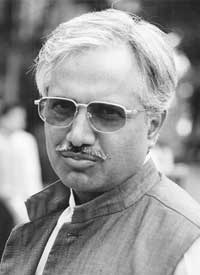 To resolve the crisis in this war torn country, King Gyanendra made his royal proclamation on October Fourth that dissolved the House of Representatives and sacked Prime Minister Sher Bahadur Deuba. But the events that followed must have made him realise the problems have not been solved in the way he thought possible. This is evident in the dismissal of Chand government and the appointment of Surya Bahadur Thapa.
To resolve the crisis in this war torn country, King Gyanendra made his royal proclamation on October Fourth that dissolved the House of Representatives and sacked Prime Minister Sher Bahadur Deuba. But the events that followed must have made him realise the problems have not been solved in the way he thought possible. This is evident in the dismissal of Chand government and the appointment of Surya Bahadur Thapa. Till date we have had two rounds of peace talks. Six informal meetings were held before the third round of talks was confirmed. The only means of communication between the two negotiating parties are letters, the contents of which hold nothing specific. For the most part, we are ignorant about what was really discussed during those informal talks. The exchange of Maoist and government missives back and forth proves the informal talks were just an act-the people have yet to hear, let alone see anything of importance emerge.
Although political parties are not part of the negotiations, they have a clear agenda. They have already started holding talks with the Maoists: their agenda is very clear and they coordinate well with the rebels. On the other hand, the government lacks vision. In a letter to the government, the Maoists asked them about their objectives and vision. They may not be on the streets, but they have succeeded in staying involved, and clear on their terms and conditions.
Although the talks in 2000 ended in failure, at least everyone's cards were on the table. The Maoists had put forward a 31-point list to Deuba's team, with three main demands: a republic, an interim government and a new constitution. The government said it would negotiate on everything but the rebel's demand for a republic. The talks held then stood on firm ground and laid the foundation for concrete negotiations. At present it is near impossible to say what the future holds. We all recognise that the talks are in jeopardy. The political parties must initiate formal and legal talks with the Maoists if we are to salvage anything.
It is of utmost importance for the political parties to intervene. The responsibility must not lie solely with the present unconstitutional government. The Maoists must not lose faith or their patience. They must be transparent with their demands to the people. We must seek a political resolution that involves the political parties.


